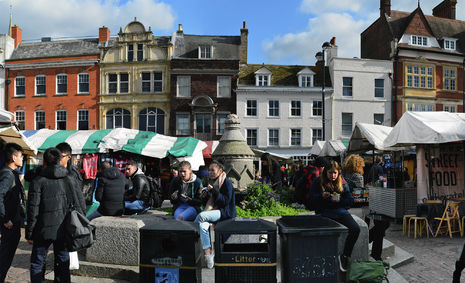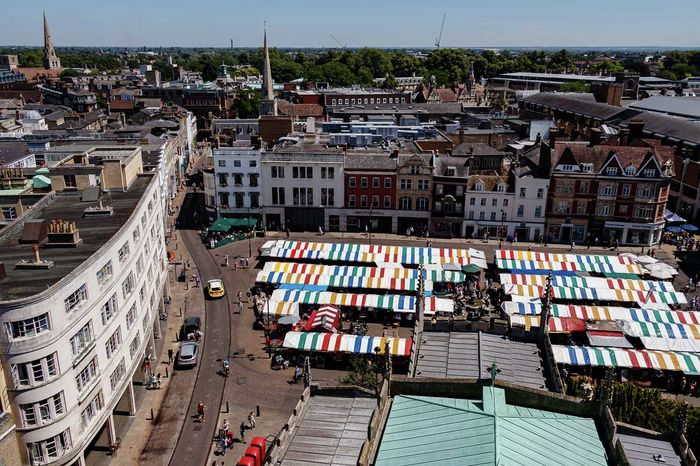Open letter highlights issues and controversies in Cambridge Market redevelopment plans
The letter states that current proposals are not suitable ‘for purpose or for public consultation’

An open letter, addressed to the councillors of Cambridge City Council, was released last week (20/03), highlighting “stark contradictions and inadequacies” in the Cambridge Market redevelopment plans. This letter was signed by the Cambridge Market Trader Association, Federation of Cambridge Residents’ Associations (FeCRA), Friends of Cambridge Market and Living Streets Cambridge.
The letter points out issues with the market redevelopment plans outlined in the drafted Market Square Vision and Concept Design, due to be reviewed by the Environment Scrutiny Committee on 25 March before progressing to further stages of implementation.
A feasibility study conducted in 2019 concluded that the market’s current arrangements restrict the amount of usable space. The report sought to suggest improvements which would improve market conditions and address safety concerns.
A Concept Design Report was subsequently curated under the leadership of consultancy companies LDA Design and Quarterbridge. The report identifies several key areas for the redevelopment of the Cambridge Market.
Demountable Stalls
The Concept Design Report highlighted that the fixed stall structures do not allow the freeing up of market space for other activities after market trading stops at 6pm. Demountable stall designs were proposed as a way of increasing the flexibility of the market space to allow for performances and events after market trading ends.
However, the open letter states that the Cambridge Market traders are strongly against this proposal due to concerns over the structural integrity of demountable stall designs and the possible impact of flexible market arrangements on operations.
The letter highlights that demountable stalls are more susceptible to strong winds which might result in more frequent market closures when high wind speeds are anticipated. Robust frames present in fixed stall structures are also crucial to support the display of heavy products and protect against the “dangerous and costly collapse” of these products.
In addition, the letter also mentions that “stallholders should be able to operate independently of each other, according to the demands of their individual businesses” due to the varying schedules of stallholders.
Julia Cox, who runs Emerald Foods in Cambridge Market for five days a week, commented in January that the proposed design was “totally unworkable”. Speaking to the Cambridge Independent, Cox said: “I imagine it would be great for a pop-up market but for serious market traders like ourselves, the fruit and veg man and the bike stall, it just wouldn’t work”
Glenys Self, spokesperson for the Friends of Cambridge Market, commented: “The concept design doesn’t respect the existing market’s modus operandi, [putting] the continuity of the market business’s success under great pressure and duress.”
Self added that the operation of the market should be prioritised over events, warning that “if there isn’t more care to detail this will kill the market.”
Furthermore, the proposed stall designs have not been prototyped anywhere else. The open letter adds that, until these kinds of stalls are trialled, “it is plainly wrong to spend any more public money on the ‘flexible space’ which is at the heart of the Council’s vision.”
Frequency of Organised Events
There are also alleged contradictions between statements which the open letter claims Councillor Rosy Moore made at the Strategy and Resources Committee, and the recommendations in the Concept Design Report pertaining to the frequency of organised events. According to the letter, Moore assured that such events were rare, while the Concept Design Report proposed regular evening events from May through September alongside three weeks of Christmas night markets.
The Council has also proposed that large-scale events can be set up the from mid-day prior to the date of the event and can be dismantled overnight after the event.
However, the letter highlights that this would cause “major disturbance to nearby residents overnight, as well as loss of 2 days’ trading for the stalls affected each time such an event is held.” In addition, the organisation of Christmas night markets would “have severe impacts on the existing traders at their busiest and most profitable time of the year.”
‘Privatisation’ of Public Space
The Concept Design Report also raises the possibility of using the redesigned market space for ticketed events.
The open letter opposes this proposal, saying that “any charging model from events would exclude the public from free access” to the Cambridge Market and that this recommendation “amount[s] to the privatising of public space”.
Stakeholder and Public Engagement
A six-week public consultation period was proposed to take place from 1 February to 12 March, with Cambridge City Council assuring that this would be “supported by a communication plan, using social and news media and other news outlets, to maximise community awareness and engagement in the consultation.”
However, the open letter argues that this was not publicised on or near the Market Square to increase the engagement of market users in the consultation process.
The letter continues that the consultation period is “premature before prototype stalls have been tried and tested in situ”. Alternatively, it suggests that the public consultation period take place after setting up prototype stalls in the market so that traders can assess the feasibility of the proposed designs and raise relevant suggestions.
Previous Backlash
The publication of this open letter follows previous controversies surrounding the Cambridge Market redevelopment plans.
Last month, redevelopment plans were delayed due to backlash over the council not publishing a report by market consultants Quarterbridge. The Quarterbridge report was made available subsequently.
The open letter states that it is “not surprising” that the Council did not publish the Quarterbridge report because “the project will not provide the returns needed to attract commercial investors.” This requires reassessment of financing and feasibility of the project, which may delay the redevelopment plans further.
According to the open letter, Cambridge City Council has spent £158,000 in financing the initial stages of the market redevelopment project, and has further allocated £320,000 to carry out the subsequent stages of implementation.
Regarding the Cambridge Market, the open letter concludes that the redevelopment plan has to be “subject to trials by traders, the public and the weather”, and the current proposals are not suitable “for purpose or for public consultation.”
The Cambridge City Council has been contacted by Varsity for comment.
 News / Colleges charge different rents for the same Castle Street accommodation2 March 2026
News / Colleges charge different rents for the same Castle Street accommodation2 March 2026 News / King’s hosts open iftar for Ramadan3 March 2026
News / King’s hosts open iftar for Ramadan3 March 2026 Theatre / Lunatics and leisure centres 4 March 2026
Theatre / Lunatics and leisure centres 4 March 2026 News / Angela Merkel among Cambridge honorary degree nominees27 February 2026
News / Angela Merkel among Cambridge honorary degree nominees27 February 2026 News / News in Brief: waterworks, wine woes, and workplace wins 1 March 2026
News / News in Brief: waterworks, wine woes, and workplace wins 1 March 2026








